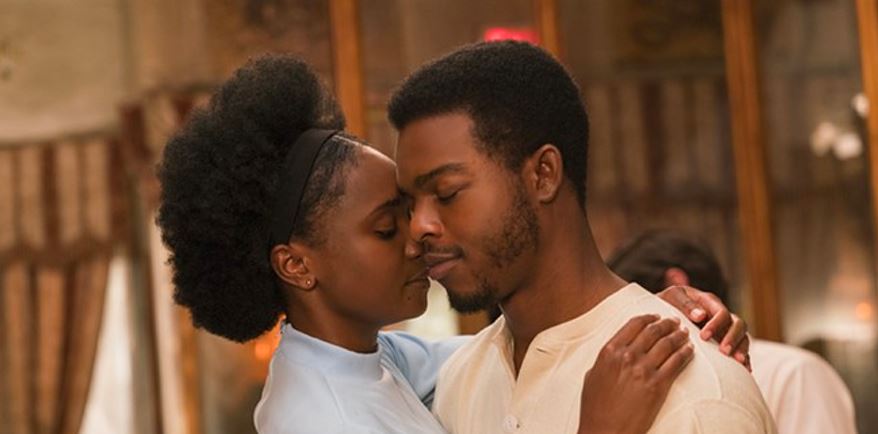| Worth seeing: | for heart-breaking performances at the core of a familiar racism drama that leaves a nihilistic taste in your mouth. |

| Director: | Barry Jenkins |
| Featuring: | KiKi Layne, Regina King, Stephan James, Aunjanue Ellis, Brian Tyree Henry, Colman Domingo, Diego Luna, Dominique Thorne, Ebony Obsidian, Ed Skrein, Emily Rios, Michael Beach, Pedro Pascal, Teyonah Parris |
| Length: | 119 minutes |
| Certificate: | 15 |
| Country: | US |
| Released: | 8th February 2019 |
WHAT’S IT ABOUT?
Tish (KiKi Layne) and Fonny (Stephan James) were childhood sweethearts.
As young adults, they’re still sweethearts and they’ve recently decided to move in moved together.
Even in Harlem, it’s hard for young black couples to find landlords to rent to them but a young Jewish property-owner takes pity on them and let’s them move into what’s little more than a shell of a Manhattan loft.
No sooner have they moved in than Fonny has a run-in with a racist police officer (Ed Skrein). Fonny comes off best but the cop vows to get even and before long, Fonny finds himself in jail, accused of a rape he couldn’t possibly have committed, but with no way to prove his innocence.
This is not the best time for Tish to find out she’s pregnant.
WHAT’S IT LIKE?
Barry Jenkins’ follow-up to his Oscar-winning Moonlight is another example of cinematic poetry; beautifully shot, sensitively played, emotionally heavy but narratively thin.
So thin, in this case, that a somewhat simple tale is told through a fractured timeline as if to liven it up a bit and give the audience more work to do. And it takes far too long to reach its inevitable conclusion.
Despite powerful messages, about the tensions between communities and even rivalries within them, little in this tragic tale feels in any way fresh; much of it feels simplistic, obvious and heavy-handed.
Just in case you hadn’t worked out that racism is bad, it makes sure that the only white Christian character of note is an evil, pernicious, racist monster and points out that even if those wretched WASPs are nasty, you can rest assured that Hispanic people, Jews and other minorities will help each other out. Although a brief and somewhat incongruous foreign interlude tries to dispel this suggestion.
The drama is at its most compelling when Tish and Fonny’s families clash over their religious ideologies, but that is sadly a footnote in just the latest telling of a familiar tale; one which has to be told, given the continued prevalence of racism, but surely there are other black stories crying out to be told that paint a more positive and less nihilistic picture?
Moonlight and Black Panther aside, almost no black story has made it to the big screen in recent years that hasn’t focused on race; entertaining, engaging and powerful in their own ways, racial dynamics are at the heart of almost everything from BLACKkKLANSMAN and TheHateUGive, to Get Out and Hidden Figures, or even Birth of a Nation and 12 Years a Slave.
Of course, from a white perspective, is easy to say this, without perhaps understanding how race – and racism – permeates all areas of life. But on the flip side, constantly agitating black people by highlighting how badly they’re treated while reminding narrow-minded white people that black people are different might just be part of the background heat that keeps the flame of racism burning.
Brimming with youthful passion, this adaptation of the novel of the same name is a heart-breaking and tragic tale of lovers being kept apart by circumstances beyond their control, driven by deep-seated racism. But given the realistic denouement, in the context of today’s ongoing racism problem, If Beale Street Could Talk feels more like a nihilistic polemic on the futility of racism than a revealing or life-affirming drama.
